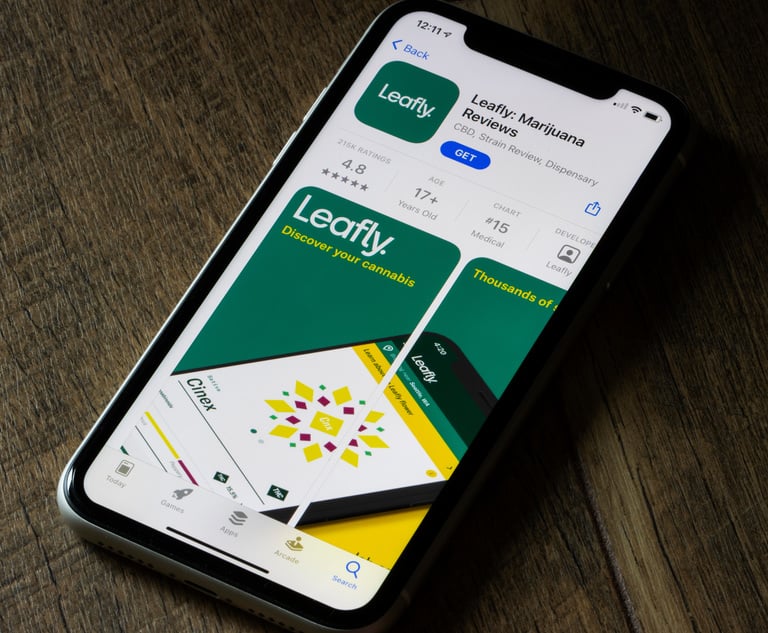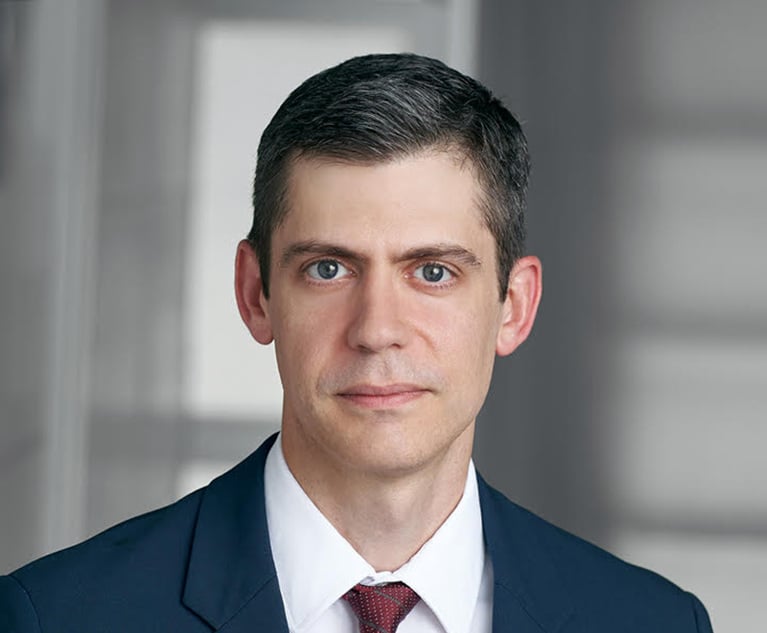Higher Law: Brownstein Hyatt, Bradley Arant and Cannabis Practices | A Curaleaf CBD Critique | Pot & Privacy | Who Got the Work
This is Higher Law, and welcome to our coverage of news and analysis for lawyers with cannabis-touching clients. Check out our Q&A with a Bradley Arant attorney as the Alabama firm positions itself in the market, and scroll down for Who Got the Work and quick-read headlines. Thanks for reading!
August 15, 2019 at 04:00 PM
9 minute read
Welcome back to Higher Law, our weekly briefing on all things cannabis. I'm Cheryl Miller, reporting for Law.com from Sacramento, where it's supposed to hit 107 degrees this afternoon. So let's cut to the chase so I can return to quiet whimpering next to the AC vent.
This week we're looking at:
• Marijuana heading south • Lessons to be learned from Curaleaf's regulatory woes • An expanded pot practice in LA • The race to cash in on marijuana lobbying
Thanks for reading. Send those tips and feedback to [email protected]. You can also reach me at 916.448.2935. Follow me on Twitter @capitalaccounts.
➤➤ Would you like to receive Higher Law as an email? Sign up here.

Q&A: Bradley Arant Jumps Into Cannabis
Last month, Birmingham-based Bradley Arant Boult Cummings became the latest Am Law 200 firm to launch a cannabis practice. With Bradley Arent's roots running deep in the South, only four of its 10 offices are located in states where some type of marijuana use is legal.
I recently talked to Whitt Steineker, co-leader of the firm's cannabis industry team, about the firm's decision to represent cannabis clients. Our interview is edited for length and clarity.
Higher Law: How does a nice Southern firm like Bradley get involved in cannabis law?
Steineker:: Our geographical footprint is pretty much in the southeast but we view ourselves as having a national practice in most of our practice groups.
We think there's a benefit to being one of the first to market in our geographic footprint. We certainly think that's something that could be to our advantage and more importantly to the advantage of people who are interested in the space and who want to learn more.
We've been amazed at the number of people who we've talked to once they were aware that it was a service that we were providing.
And then the Farm Bill—we were going to do this probably before the Farm Bill—but the Farm Bill really sent this into overdrive on the hemp side.
Have all the states where Bradley has offices adopted rules or guidance for bar members in the cannabis practice?
It varies. The District of Columbia has. I know Florida has. Alabama has not, as of yet. I don't believe Mississippi has. That's something we monitor. We make sure that anything we're doing is in compliance with any professional rules but also any guidance that's put out by the state bars.
Was there any concern about what other Bradley clients might think about the firm launching a cannabis practice?
We had a long dialog that spanned a number of months about whether we wanted to get into this space and, if so, how we wanted to go into this space and how we wanted to market it. And I think I reached the conclusion that I think was shared by our management that there was a need in this industry for high-level strategic legal services to our existing clients and to potential clients. And we felt like we were able to offer the same type of thoughtful, conservative advice to people either in the cannabis industry or dealing with the cannabis industry that we were to any of our other clients.
What's the biggest issue on your plate right now?
It's really trying to stay as current as you can to manage some of the uncertainties that are in both the marijuana and hemp space. Trying to make sure your clients understand the areas with growing certainty about what is allowed. And also make sure, probably more importantly, that they understand where there is still a great deal of uncertainty.
Even with the Farm Bill and the opening up of hemp, even with that, we have to tell people all the time there are caveats and guidance documents coming out from different state and federal agencies all the time that everybody needs to be aware of. It's taking the time to stay on top of that, to fully understand that and then to communicate that with clients. That's really important because it drives any of the counsel we offer people in the space.

'Mistakes Snowball': A Curaleaf Critique
Vince Sliwoski at Harris Bricken's Canna Law Blog has an interesting take on the recent troubles faced by Curaleaf, the Massachusetts-based cannabis operator who drew a warning letter from the U.S. Food and Drug Administration last month over dubious claims about the healing powers of CBD.
That attracted the inevitable securities class action. Then last week the state of Massachusetts slapped Curaleaf with a $250,000 fine for failing to get regulators' OK before changing its ownership structure.
"As you read, keep in mind that Curaleaf claims to be the 'world's largest cannabis company by revenue and the largest in the U.S. across key operating metrics,'" Sliwoski writes. "And then marvel at how ham-handed this whole thing is."
There are two lessons to be gleaned from this episode, says Sliwoski. "First, mistakes tend to snowball," he writes, noting that a quickly addressed FDA warning letter led litigation. "Second, when it comes to state compliance, it is generally notbetter to ask forgiveness than permission."
Higher Law asked the FDA for Curaleaf's written response to the agency's warning letter. The FDA declined our request, saying "disclosure could reasonably be expected to interfere with enforcement proceedings."
We asked Curaleaf general counsel Todd Goffman for a copy. A spokeswoman responded by referring us to a July 26 company statement saying Curaleaf had removed certain statements, flagged by the FDA, from its website and social media.
"Additionally, Curaleaf Hemp advised FDA that a number of the products mentioned in the FDA letter had previously been discontinued," the company's statement said.

Who Got the Work
• The Rimon Law Group is expanding its cannabis and hemp team with the addition of five attorneys from the Frontera Law Group. Partners Justin Keller and Lukian Kobzeff and associates Alexandra Brown, Paul Castillo, and Patrick Devine have joined the firm's Los Angeles office, the firm announced. My colleague Xiumei Dong has more here.
• Brownstein Hyatt Farber Schreck said it has launched a cannabis and industrial hemp practice group. The practice will be co-chaired by Denver-based partner Melissa Kuipers Blake in the Denver office and partner Amy Steinfeld in Santa Barbara, California. Brownstein Hyatt already has an active federal lobbying practice representing cannabis clients in Washington, D.C.
• David Branfman of Branfman Mayfield Bustarde Reichenthal in Solana Beach and Elizabeth Rest of Crown in San Francisco have been named chair and vice chair of the California Lawyers Association's Cannabis Intellectual Property Law Interest Group. The group plans to offer monthly telephone call-in meetings on the first Thursday of each month as well as live seminars and webinars.

In the Weeds…
>> Lobbyists are racing to cash in on the cannabis boom. "K Street is rushing to capitalize, highlighted this week by the highest-grossing firm, Brownstein Hyatt Farber Schreck, launching a new Cannabis and Industrial Hemp Industry Group," The Hill reports. Brownstein Hyatt joins Akin Gump and Squire Patton Boggs as a major firm lobbying on cannabis issues. [The Hill]
>> CBD is everywhere. But is regulation keeping up with demand? "In the gray area between state and federal regulations, and in the shifting used to describe (and sometimes conflate) cannabis, marijuana and hemp, dubious promotions have proliferated." The FDA has publicly cracked down on unsubstantiated medical claims about CBD. Still, questionable advertising has some researchers comparing CBD to snake oil. [The New York Times] >> The CBD craze is getting out of hand, says Scott Gottlieb. The former commissioner of the FDA argues for a quicker path to oversight of CBD than the agency's traditional rule-making process. Congress should clarify that the FDA doesn't need to issue broad regulations on CBD but can instead rely on petitions from individual producers, he suggests. CBD could be added to food but only if the products meet minimum guidelines. [The Washington Post]
>> Hey feds: ease up on marijuana-legal states. That was the message this week from the American Bar Association's House of Delegates, which approved a resolution urging the federal government to make the Controlled Substances Act's marijuana provisions inapplicable to operators complying with state laws. [ABA Journal]
>> Will pot and privacy issues clash in Massachusetts? New rules under consideration by the Cannabis Control Commission would require anyone delivering marijuana in the Bay State to wear a body camera. Delivery vehicles would also have to be equipped with GPS trackers and lock boxes. [WCVB]

The Calendar: All the Things
Aug. 17-18 - The CannaGrow Expo will take place in Palm Springs, California. Expected speakers include Kimberly Simms of the Law Offices of Kimberly Simms; Travis Bliss, IP attorney at Buchanan Ingersoll & Rooney; and Dana Cisneros, an attorney at Cannabis Corporate Law Firm.
Aug. 20 - Duane Morris hosts the webinar "Cannabis 204: The Roundup of State Cannabis Legislation." Presenters include partners Neville Bilimoria, Paul Josephson and Martin Shulkin.
Aug. 21 - Sheppard Mullin presents the webinar "Cannabis Regulation Is the New Frontier in Real Estate and Land Use Control." Presenters are firm partner Whitney Hodges and associate Stephanie Sweat.
This content has been archived. It is available through our partners, LexisNexis® and Bloomberg Law.
To view this content, please continue to their sites.
Not a Lexis Subscriber?
Subscribe Now
Not a Bloomberg Law Subscriber?
Subscribe Now
NOT FOR REPRINT
© 2025 ALM Global, LLC, All Rights Reserved. Request academic re-use from www.copyright.com. All other uses, submit a request to [email protected]. For more information visit Asset & Logo Licensing.
You Might Like
View All
NY Cannabis Marketing Rulings / Rescheduling Effects / Honigman's Work on Trademark Suit / Goodbye
9 minute read
Workplace Weed and Labor Pacts / State AGs and Hemp / Maryland Licensing Suit / Vicente Sues Recruiter
9 minute readTrending Stories
- 1Public Notices/Calendars
- 2Wednesday Newspaper
- 3Decision of the Day: Qui Tam Relators Do Not Plausibly Claim Firm Avoided Tax Obligations Through Visa Applications, Circuit Finds
- 4Judicial Ethics Opinion 24-116
- 5Big Law Firms Sheppard Mullin, Morgan Lewis and Baker Botts Add Partners in Houston
Who Got The Work
J. Brugh Lower of Gibbons has entered an appearance for industrial equipment supplier Devco Corporation in a pending trademark infringement lawsuit. The suit, accusing the defendant of selling knock-off Graco products, was filed Dec. 18 in New Jersey District Court by Rivkin Radler on behalf of Graco Inc. and Graco Minnesota. The case, assigned to U.S. District Judge Zahid N. Quraishi, is 3:24-cv-11294, Graco Inc. et al v. Devco Corporation.
Who Got The Work
Rebecca Maller-Stein and Kent A. Yalowitz of Arnold & Porter Kaye Scholer have entered their appearances for Hanaco Venture Capital and its executives, Lior Prosor and David Frankel, in a pending securities lawsuit. The action, filed on Dec. 24 in New York Southern District Court by Zell, Aron & Co. on behalf of Goldeneye Advisors, accuses the defendants of negligently and fraudulently managing the plaintiff's $1 million investment. The case, assigned to U.S. District Judge Vernon S. Broderick, is 1:24-cv-09918, Goldeneye Advisors, LLC v. Hanaco Venture Capital, Ltd. et al.
Who Got The Work
Attorneys from A&O Shearman has stepped in as defense counsel for Toronto-Dominion Bank and other defendants in a pending securities class action. The suit, filed Dec. 11 in New York Southern District Court by Bleichmar Fonti & Auld, accuses the defendants of concealing the bank's 'pervasive' deficiencies in regards to its compliance with the Bank Secrecy Act and the quality of its anti-money laundering controls. The case, assigned to U.S. District Judge Arun Subramanian, is 1:24-cv-09445, Gonzalez v. The Toronto-Dominion Bank et al.
Who Got The Work
Crown Castle International, a Pennsylvania company providing shared communications infrastructure, has turned to Luke D. Wolf of Gordon Rees Scully Mansukhani to fend off a pending breach-of-contract lawsuit. The court action, filed Nov. 25 in Michigan Eastern District Court by Hooper Hathaway PC on behalf of The Town Residences LLC, accuses Crown Castle of failing to transfer approximately $30,000 in utility payments from T-Mobile in breach of a roof-top lease and assignment agreement. The case, assigned to U.S. District Judge Susan K. Declercq, is 2:24-cv-13131, The Town Residences LLC v. T-Mobile US, Inc. et al.
Who Got The Work
Wilfred P. Coronato and Daniel M. Schwartz of McCarter & English have stepped in as defense counsel to Electrolux Home Products Inc. in a pending product liability lawsuit. The court action, filed Nov. 26 in New York Eastern District Court by Poulos Lopiccolo PC and Nagel Rice LLP on behalf of David Stern, alleges that the defendant's refrigerators’ drawers and shelving repeatedly break and fall apart within months after purchase. The case, assigned to U.S. District Judge Joan M. Azrack, is 2:24-cv-08204, Stern v. Electrolux Home Products, Inc.
Featured Firms
Law Offices of Gary Martin Hays & Associates, P.C.
(470) 294-1674
Law Offices of Mark E. Salomone
(857) 444-6468
Smith & Hassler
(713) 739-1250










